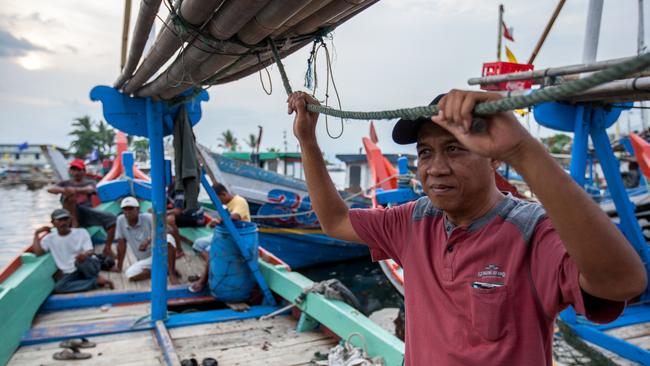Medivac law changes nothing: Java boatmen
Indonesia’s asylum-seeker community and the fishermen who once ferried them here agree: nothing changes while turnbacks remain.

Australia’s new medivac law may be stirring furious debate at home, but among Indonesia’s asylum-seeker community and the fishermen who once ferried them across the Indian Ocean, the consensus is that nothing changes while boat turnbacks remain in place.
Notwithstanding intelligence agency warnings that “the beast is stirring” in Indonesia, and the government’s pre-emptive decision to reopen the Christmas Island detention centre, no one The Australian spoke to yesterday believed the law would prompt a fresh flood of asylum vessels.
On remote Rote Island, Indonesia’s closest landmass to Australia’s maritime border, local fishermen’s advocate Sadli Hudari Ardani said there was no sign that traffickers were preparing to restart the boat trade since legislation passed on Tuesday allowing very ill refugees in offshore detention to be treated in Australia.
“There are a number of middlemen in Papela village who have direct contact with (smuggling) bosses and there has been no recent contact,’’ Mr Sadi said.
“If there had, these people would be busy going from one fisherman to the next and they haven’t done that so far. The fishermen here are very talkative and would tell everything to anyone, so I would know.’’
Rote fishermen are renowned navigators and many have earned good money piloting asylum boats, so were alive to the possibility of the trade resuming, but “what matters for the fishermen is whether the turnbacks are still in place or not”, he added.
“If the turnback policy ends then traffickers will restart but if they are still in place fishermen won’t do it because they won’t get paid if the asylum-seekers don’t make it to Australia. They don’t worry about going to an Australian prison but if they are turned back they risk a minimum five years’ jail in Indonesia. That’s what they are scared of.”
In any case, he said, boats would be more likely to launch along Java’s long southern coastline, where asylum-seekers can blend in with tourists, than from Rote.
In Cibangban, one of dozens of small fishing villages along south Java’s Pelabuhan Ratu bay, from where hundreds of asylum boats once set off on the perilous two-day, two-night journey to Christmas Island, a group of fishermen says the “heyday” has passed.
One man, Darji, says he ferried more than 1000 asylum-seekers to larger boats offshore, earning 3 million rupiah ($300) for each night’s work before fatal boat sinkings and a 2015 crackdown all but ended the trade. The last time he did so, in June 2017, he was arrested and spent a month in jail.
Authorities have made it very clear to fishing communities across Indonesia that anyone helping people-smugglers faces at least five years in jail. “No one has contacted me since then and I wouldn’t do it anyway because my name is already in Indonesian police records,” says Darji. “If I am sure I won’t get arrested then probably I would take the offer, but things are too uncertain … now.”
At Pelabuhan Ratu city’s main port, fishermen point to a wreck of larger boats previously used to fish for shark fin in waters further offshore, which doubled as asylum vessels when smugglers came calling. With the crackdown on both trades, they have been left to rot.
One older man, Yosep, said “many, many fishermen in Pelabuhan Ratu have spent time in an Australian prison” for transporting asylum-seekers, including his younger brother, and wouldn’t do it again. “No one has come around here recently,” he says. “There’s been no big (smuggling) bosses, no middlemen, or immigrants.”
Even refugees facing a decades-long wait for resettlement, including those who admit they would try their luck if the boats resumed, said yesterday that while they welcomed the medivac bill it did not alter their situation.
“I’m trying to be an optimist but I don’t think this changes anything,” said Abdul Raouf, a young Afghan Hazara refugee in East Nusa Tenggara.
Mohammad Hassan, another Hazara who has tried 13 times to get to Australia by boat, said most people he knew were just waiting for the Australian elections.
“Many, many people are hoping the new government will open up more opportunities for refugees to come legally,” he said.


